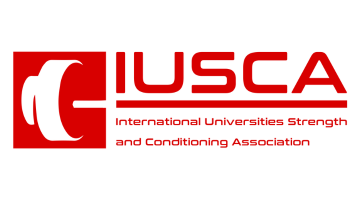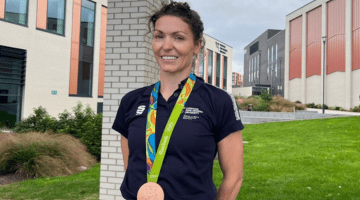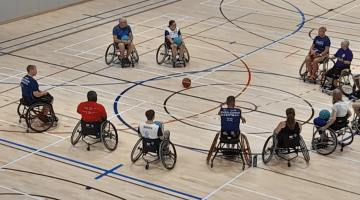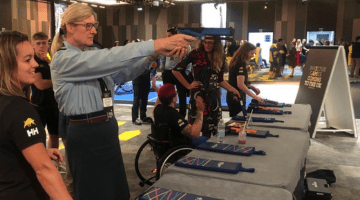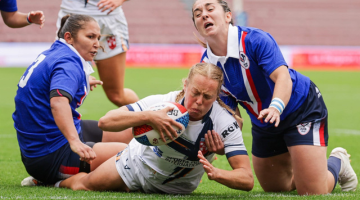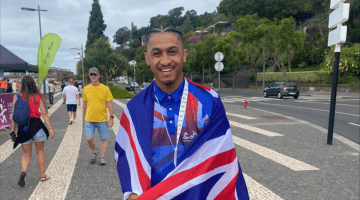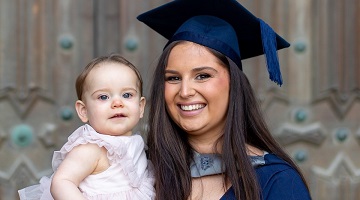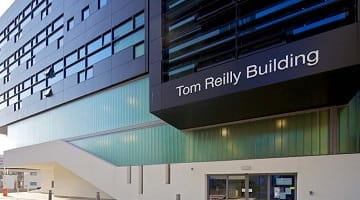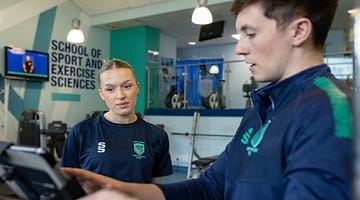About this course
LJMU's MSc in Strength and Conditioning produces world-class, research-informed practitioners who have the option to pursue a career in research.
- The School of Sport and Exercise Sciences is ranked 6th for Sports Science (QS World University Rankings 2024)
- Study on a course delivered by world-leading researchers and applied practitioners in LJMUs pioneering School of Sport and Exercise Sciences
- Access state-of-the-art strength and conditioning facilities including physiology, biomechanics and molecular biology labs and the newly refurbished, high performance gym
- Look forward to career opportunities as an Applied Practitioner in strength and conditioning, teaching and lecturing and in doctoral research programmes
- Benefit from an applied strength and conditioning placement at a top-class sporting institution, such as clubs within the English Premier League/Championship/Womens Super League Football, Rugby League Super League/Championship, British Basketball League, Premiership/Championship Rugby Union, the Lawn Tennis Association, the English Institute of Sport, SportScotland Institute of Sport and National Collegiate Athletic Association Universities
This Strength and Conditioning Masters is ideal for individuals who currently hold an undergraduate degree in sports science, strength and conditioning or a related topic, and want to advance their knowledge, research skills and expertise in strength and conditioning.
The programme opens up a world of scientific innovation, research and the related application of specially designed strength and conditioning support that can help sportsmen and women to achieve their goals.
You will learn to make decisions in complex and unpredictable situations and you will ultimately contribute to the essential support framework demanded by the sport industry for success.
The course is built on a solid structure of research skills, applied methodologies and the latest research in physiology, biomechanics and coaching science, all of which are essential to become a Strength and Conditioning Practitioner.
You will develop essential skills in communicating and implementing your recommendations for clients, as well as specialist and non-specialist audiences.
Course modules
Discover the building blocks of your programme
Your programme is made up of a number of core modules. One module is an applied placement - this replaces your dissertation or research project and will demonstrate your advanced learning.
Further guidance on modules
Modules are designated core or optional in accordance with professional body requirements, as applicable, and LJMU’s Academic Framework Regulations. Whilst you are required to study core modules, optional modules provide you with an element of choice. Their availability may vary and will be subject to meeting minimum student numbers.
Where changes to modules are necessary these will be communicated as appropriate.
Core modules
Professional accreditation/links
With membership of ASET, the UK’s leading authority on work based and placement learning, LJMU’s School of Sport and Exercise Sciences is committed to providing Work-based and Placement Learning (WBPL) experiences to our students that are quality assured and supported in accordance with best practice guidelines.
Your Learning Experience
An insight into teaching on your course
Study hours
Students will have approximately two to three hours per module per week of taught material and/or seminar work in semester 1 (September to December) and semester 2 (January to April). This may be supplemented by reflective tutorials. Private study will cover both time spent studying (e.g. in the library), collecting data in the laboratory and completing directed tasks and coursework. Taught sessions will provide an orientation to the topic and opportunity for classroom discussion and debate. You will also be expected to read widely using primary sources of reference material. The applied placement in semester 3 (May to August) will require the student to spend a minimum of 130 hours with the placement provider, which will be supplemented by hours spent preparing for placement duties, private study and tutorials/meetings with the placement provider and placement tutor.
Teaching methods
Teaching will take place in small groups, using the world-class facilities in LJMU's award-winning Tom Reilly and Life Sciences Buildings and the newly refurbished, high performance gym. It will have a strong research focus to help you become a critical scientific thinker, empowering you to challenge existing paradigms and be a better practitioner. You will be taught by academics who work with a range of elite organisations.
Applied learning
The course includes an applied placement in one of many top-class sporting institutions. You will benefit from our strong links with some of the best sporting institutions in the UK and abroad, including the English Institute of Sport, the Rugby League Super League and Championship, the Rugby Union Championship, the English Football League, the FA Women's Super League, the Gaelic Sports Research Center, British Rowing and many more.
How learning is monitored on your programme
To cater for the wide-ranging content of our courses and the varied learning preferences of our students, we offer a range of assessment methods on each programme.
Assessment methods on this course include: essays, exams, case studies, periodisation presentations, laboratory reports, literature reviews and practical assessments.
Where you will study
This programme is based in the City Campus. You will have access to world-class facilities in LJMU's award-winning Tom Reilly and Life Sciences Buildings.
Course tutors
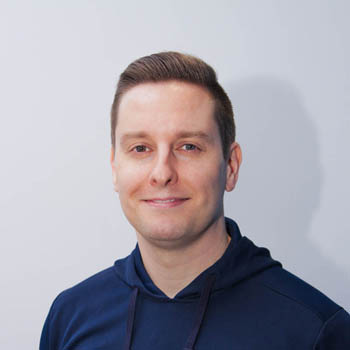
Dr Carl Langan-Evans
Programme Leader
I enjoy interacting with students to provide them with research practitioner skillsets that are necessary to succeed in the world of work
I enjoy interacting with students to provide them with research practitioner skillsets that are necessary to succeed in the world of work
Dr Langan-Evans is a Senior Lecturer and Programme Leader on MSc Strength and Conditioning. He completed a PhD in Applied Sport Physiology and Nutrition and an MRes in Sport Physiology at LJMU. Dr Langan-Evans is an accredited Strength and Conditioning Coach (ASCC) with the United Kingdom Strength and Conditioning Association (UKSCA). His areas of expertise include strength and conditioning, applied sport physiology and performance nutrition. Dr Langan-Evans is a former elite athlete in the sport of Taekwondo and took part in LJMUs Sport Scholarship programme from 2004 until 2008.
Career paths
Further your career prospects
LJMU has an excellent employability record with 96% (HESA 2018) of our postgraduates in work or further study six months after graduation. Our applied learning techniques and strong industry connections ensure our students are fully prepared for the workplace on graduation and understand how to apply their knowledge in a real world context.
On graduation from this course you can look forward to career opportunities as an Applied Practitioner in strength and conditioning, in teaching and lecturing or as a doctoral researcher.
Tuition fees and funding
- Fee:
- £10,705
The University reserves the right to increase tuition fees in accordance with any changes to the maximum allowable fees set by the UK Parliament. In the event of such a change, any fee increase will be subject to a maximum cap of 10% of the total course cost as originally stated at the time of your offer.
Fees
The fees quoted at the top of this page cover registration, tuition, supervision, assessment and examinations as well as:
- library membership with access to printed, multimedia and digital resources
- access to programme-appropriate software
- library and student IT support
- free on-campus wifi via eduroam
Additional costs
Although not all of the following are compulsory/relevant, you should keep in mind the costs of:
- accommodation and living expenditure
- books (should you wish to have your own copies)
- printing, photocopying and stationery
- PC/laptop (should you prefer to purchase your own for independent study and online learning activities)
- mobile phone/tablet (to access online services)
- field trips (travel and activity costs)
- placements (travel expenses and living costs)
- student visas (international students only)
- study abroad opportunities (travel costs, accommodation, visas and immunisations)
- academic conferences (travel costs)
- professional-body membership
- graduation (gown hire etc)
Funding
There are many ways to fund postgraduate study for home and international students. From loans to International Scholarships and subject-specific funding, you’ll find all of the information you need on our specialist postgraduate funding pages.
Please be aware that the UK’s departure from the EU may affect your tuition fees. Learn more about your fee status and which tuition fees are relevant to you.
Entry requirements
You will need:
Qualification requirements
How to apply
Securing your place at LJMU
To apply for this programme, you are required to complete an LJMU online application form. You will need to provide details of previous qualifications and a personal statement outlining why you wish to study this programme.
There will be no interview. The programme will typically register 15 students in the first year, followed by 20 students per year thereafter.
Applicants will be selected on merit, alongside an obvious desire to pursue a career in strength and conditioning.
You will need to submit a Personal Statement in your application. Personal Statements are assessed on evidence of:
- recent achievements
- passion for strength and conditioning
- career trajectory
Your university life
From accommodation and academic support to clubs and societies. Find out what LJMU has to offer.
Related Links
Talk to our students
Connect with a current LJMU student for advice and guidance on university life, courses and more.
See what our students are saying
At LJMU we want you to know you’re making the right choice by studying with us. You can see what our students are saying about their experience with us through their reviews on the following websites:
Related Links
News and views
Browse through the latest news and stories from the university
The University reserves the right to withdraw or make alterations to a course and facilities if necessary; this may be because such changes are deemed to be beneficial to students, are minor in nature and unlikely to impact negatively upon students or become necessary due to circumstances beyond the control of the University. Where this does happen, the University operates a policy of consultation, advice and support to all enrolled students affected by the proposed change to their course or module.



















